#custom ehr software development
Explore tagged Tumblr posts
Text
EHR and EMR Software Development Company | Bitcot Looking for expert emr software development services? Bitcot offers customized, scalable EMR solutions designed for hospitals, clinics, and healthcare startups. Their services include cloud-based EMR platforms, mobile EMR app development, and custom dashboards that enhance workflow efficiency and patient care. With a strong focus on HIPAA compliance, data security, and seamless integration with labs, pharmacies, and billing systems, Bitcot delivers smart, reliable healthcare technology.
#emr software development#emr software solutions#ehr software development#ehr software development company#emr software development company#custom ehr software development
0 notes
Text
Healthcare IT Consulting Services vs. In-House IT: Which Is Best for B2B Healthcare?
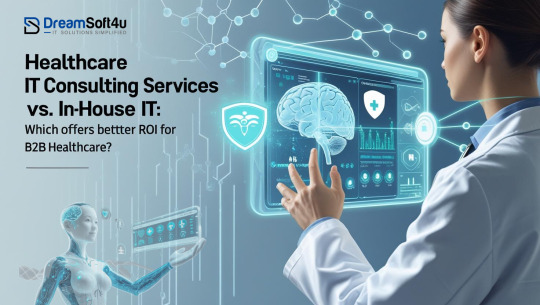
In today’s digitally driven healthcare environment, technology is more than a support function—it’s a core pillar of patient care, regulatory compliance, and operational efficiency. For B2B healthcare organisations, the question is no longer “if” but “how” to implement technology that scales, adapts, and performs.
The debate begins here: Should you invest in Healthcare IT Consulting Services or build an In-House IT department? Both have merits—but which one aligns better with your goals, compliance requirements, and long-term ROI?
This comprehensive guide breaks down the comparison to help your healthcare organization make a strategic, informed decision.
What Is In-House IT in Healthcare?
An in-house IT department consists of technical staff hired directly by the healthcare organization. These professionals handle all tasks internally—from network setup and data security to building or maintaining custom healthcare software.
Key Traits:
Full-time staff on payroll
Deep familiarity with internal systems
Long-term technical support and development
What Are Healthcare IT Consulting Services?
Healthcare IT consulting services are offered by third-party firms that specialise in healthcare-specific technology. These consultants provide tailored solutions, strategic roadmaps, and implementation support for software, infrastructure, compliance, and more.
Key Traits:
Specialized in healthcare IT regulations and innovations
Flexible, on-demand expertise
Typically project-based or strategic partnerships
Comparing the Two: Core Evaluation Criteria
1. Cost Efficiency
In-House IT: Setting up a full internal IT department involves hiring skilled professionals, purchasing hardware/software licenses, ongoing training, and managing turnover. These costs can escalate quickly.
Consulting Services: Consulting might seem expensive upfront but can be more cost-effective for projects requiring niche expertise. It eliminates hiring overhead, speeds up implementation, and reduces delays—saving time and money.
Verdict: For B2B healthcare firms aiming to scale or implement tech rapidly, consultants offer better cost control.
2. Expertise and Specialization
In-House IT: You get consistent support, but internal teams may lack exposure to newer technologies or broad healthcare IT challenges.
Healthcare IT Consultants: These professionals work across multiple clients and bring cutting-edge knowledge in areas like EHR integration, HIPAA compliance, cloud migration, AI integration, and more.
Verdict: For complex challenges or innovation-driven goals, consultants provide a wider range of expertise.
3. Scalability and Flexibility
In-House IT: Scaling teams requires hiring, onboarding, and training—this can delay urgent projects.
Healthcare IT Consulting Services:Consulting firms can scale resources up or down on demand. Need to roll out custom software in 3 locations simultaneously? A consultant can staff a cross-functional team instantly.
Verdict: Consultants win on scalability, especially for time-sensitive and multi-location implementations.
4. Compliance and Security
Healthcare regulations such as HIPAA, HITECH, GDPR, and HL7 demand precise compliance.
In-House IT: Your team may know your systems well, but they must be trained constantly on evolving regulations.
Consultants: They live and breathe compliance. From secure data migration to user access controls, healthcare IT consulting services specialize in safeguarding your organization.
Verdict: Consultants provide stronger compliance strategies, reducing your regulatory risk.
5. Speed to Market
In-House IT: Internal processes can be slow due to approval chains, limited capacity, or skill gaps.
Consultants:Consulting firms accelerate deployment—whether it's custom healthcare software development, infrastructure upgrades, or cloud transitions. Time to value is significantly reduced.
Verdict: Consultants ensure faster project execution and quicker ROI.
6. Innovation and Technology Access
In-House IT: Limited exposure to broader industry advancements may result in stagnation or outdated tools.
Consulting Services: Partnering with consultants gives you access to best practices, advanced tech stacks, AI/ML models, and interoperability tools. They often work with top healthcare vendors and bring these insights directly to your team.
Verdict: Consultants bring innovation into your digital ecosystem.
Real-World Examples
Consulting Case Study:
A regional hospital chain partnered with a healthcare IT consulting firm to implement a custom telehealth platform across five locations. The rollout was completed in 90 days with integrated EHR support, resulting in a 35% increase in remote consultations and reduced patient no-show rates.
In-House IT Case Study:
A diagnostics company built an in-house IT team to manage their custom healthcare data analytics system. While the learning curve was steep, it gave them direct control over data pipelines and helped align daily operations with tech-driven insights.
When to Choose Healthcare IT Consulting Services
You’re scaling operations across multiple locations
You need expertise in compliance-heavy systems (EHRs, RPM, AI)
You want fast implementation with reduced internal disruption
You require end-to-end custom healthcare software development
You lack internal staff for short-term but critical tech projects
When to Choose In-House IT
You have long-term, ongoing development needs
You want full control over your infrastructure and data
You have the budget and time to recruit and build a skilled team
You operate in a single location or with fewer compliance complexities
Hybrid Model: Combining the Best of Both Worlds
Many B2B healthcare companies today opt for a hybrid model—building a core internal IT team for support and control while engaging consultants for high-value, specialised projects.
For instance, your in-house team can maintain daily operations, while consultants handle software architecture, integrations, or AI modules, delivering agility and continuity.
Conclusion
Choosing between Healthcare IT Consulting Services and In-House IT should depend on your strategic goals, operational scale, regulatory needs, and innovation appetite.
Want speed, innovation, and compliance with limited overhead? Go consulting.
Want control, continuity, and long-term team building? Build in-house.
Want both? Design a hybrid approach.
Every healthcare organisation’s journey is different, but your tech decisions today will define your patient outcomes, competitive edge, and business success tomorrow.
#healthcare it consulting services#custom healthcare software development#in-house IT#b2b healthcare solutions#medical IT strategy#healthcare technology#IT outsourcing healthcare#healthcare software ROI#EHR consulting#healthtech blog
0 notes
Text
Revolutionizing Patient Care: On-Demand Healthcare Mobile App Development Company for 2025

Introduction: Healthcare at Your Fingertips.
In today's fast-paced digital world, healthcare must keep up with the growing demand for real-time services and patient-centric experiences. On-demand healthcare mobile apps are now playing a pivotal role in modernizing the healthcare industry by allowing patients to schedule appointments, consult physicians remotely, and track their wellness anytime, anywhere. At CQLsys Technologies, we are at the forefront of this digital health transformation. As a trusted Healthcare App Development Company, we offer a wide range of custom healthcare mobile app solutions tailored to hospitals, clinics, wellness brands, and startups.
Whether you're planning to develop a medical appointment app, a telemedicine platform, or a personalized health tracking tool, our comprehensive Healthcare App Development Services are designed to deliver secure, scalable, and intuitive user experiences.
Why On-Demand Healthcare Apps Are Transforming the Industry
On-demand healthcare apps are rapidly reshaping patient-provider interactions. By reducing wait times, improving remote access to healthcare professionals, and enabling real-time health tracking, these apps empower patients while streamlining provider workflows. With features like digital prescriptions, chat-based support, and secure EHR integrations, on-demand healthcare solutions are becoming indispensable.
Healthcare institutions now rely on HIPAA-compliant healthcare App Development to protect sensitive patient data and maintain regulatory standards. Whether it's Health Monitoring App Development, EHR/EMR App Development, or launching a virtual clinic, mobile technology ensures better health outcomes and faster innovation cycles.
Tailored Healthcare App Development for All Stakeholders

Generic solutions don’t address the complexity of healthcare workflows. That’s why Custom Healthcare App Development is essential. CQLsys Technologies builds smart, custom-fit mobile solutions that align perfectly with your operational goals and compliance requirements.
Whether you're a hospital seeking centralized patient data access, a clinic looking to digitize appointments, or a startup building the next big Telemedicine App Development product, we offer modular, scalable, and secure healthcare app solutions.
Our apps integrate seamlessly with third-party platforms, wearable devices, and legacy systems, ensuring they evolve with your business. From Mobile Health App Development to fitness and wellness tracking, we craft experiences that are functional, flexible, and future-ready.
Key On-Demand Healthcare App Solutions We Offer

1. Medical Appointment App Development: Patients no longer need to wait on hold or stand in queues. Our appointment apps let users book, reschedule, or cancel visits effortlessly. Real-time calendar sync, doctor profiles, and reminders ensure a seamless experience.
2. Telemedicine App Development:t Virtual healthcare is no longer optional. Our telemedicine apps support secure video consultations, AI-based triaging, prescription sharing, and chat functionality, bringing doctors and patients closer than ever.
3. Health Tracking App Development Empower users to monitor vital health stats—like glucose levels, heart rate, and sleep patterns—through feature-rich mobile apps integrated with wearable devices and health sensors.
4. Patient Care App Development Support continuous care through personalized reminders, post-surgery follow-ups, and symptom checkers. These apps improve patient engagement and enhance recovery outcomes.
5. Fitness and Wellness App Development. From diet plans to exercise tracking, our wellness apps are designed to help users meet lifestyle goals. Custom-built for wellness brands, gyms, and health coaches.
Built-In HIPAA Compliance for Security and Trust.
We know that trust is the backbone of any healthcare service. At CQLsys, all our mobile health applications are developed to meet HIPAA compliance standards. This means strong data encryption, secure cloud infrastructure, and strict access control.
Our team implements features such as two-factor authentication, audit trails, and role-based access, ensuring maximum security for patient records. If you're looking for HIPAA-compliant healthcare App Development, we are your go-to partner.
Complete Suite of Healthcare App Development Services.

As a full-cycle Healthcare Software Development company, we offer:
Healthcare App Development for Startups – Rapid prototyping, MVP development, and scalable builds for startup healthcare ventures.
Mobile Health App Development – User-friendly apps focused on tracking wellness, fitness, and medical history for proactive care.
EHR/EMR App Development – Integrated apps that sync with existing hospital records and ensure data continuity.
Healthcare App for Hospitals – Unified platforms for managing hospital operations, patient workflows, and remote consultations.
Health Monitoring App Development – Real-time monitoring with wearable integration for chronic care and elderly support.
Why Choose CQLsys Technologies for Healthcare App Development
Healthcare Domain Expertise We understand healthcare—inside and out. Our developers, designers, and analysts have years of experience building compliant, reliable, and scalable Health Tech App Development solutions.
Customized Development. Every healthcare organization is different. We provide Custom Healthcare App Development based on individual workflows, compliance needs, and growth targets.
360° Development Approach From planning and wireframing to coding, testing, and post-deployment support, we deliver end-to-end mobile healthcare solutions.
Future-Ready Architecture Our scalable architecture ensures your app grows with your business and can be adapted to include emerging technologies like AI and IoT.
Cross-Platform Functionality Using Flutter, React Native, and native stacks, we deliver apps that perform optimally across Android, iOS, and web environments.
Emerging Trends in Healthcare App Development
The next frontier in healthcare app development is driven by innovation:
AI-Based Diagnostics: Predictive healthcare using machine learning.
IoT Integration: Wearable-based real-time vitals tracking.
Blockchain: Tamper-proof patient record storage and sharing.
Voice Assistants: Voice-activated health apps for elderly or differently-abled users.
At CQLsys, we actively incorporate these trends into our development strategy, making us a top choice for Healthcare App Development for Startups and established enterprises alike.
Conclusion: Redefine Healthcare with CQLsys.
In a healthcare world moving toward digital-first solutions, your mobile app can be the game-changer that improves care outcomes, increases access, and enhances operational efficiency.
CQLsys Technologies stands out as a top Healthcare App Development Company dedicated to delivering innovative, HIPAA-compliant, and user-focused healthcare mobile solutions. Whether it's a telemedicine app, a Patient Care App Development project, or a full-fledged Healthcare App for Hospitals, we help you build for impact.
Take the first step toward smarter healthcare. Get in touch with us today to build a secure, scalable, and successful healthcare mobile app.
#On‑Demand Healthcare Mobile App Development Company#Healthcare App Development Company#Healthcare App Solutions#Medical App Development Services#Medical Appointment App Development#Custom Healthcare App Development#Telemedicine App Development#Patient Care App Development#Health Tracking App Development#Healthcare Mobile App Solutions#Health Monitoring App Development#Health Tech App Development#Healthcare Software Development#Healthcare App Development Services#Fitness and Wellness App Development#Healthcare App for Hospitals#HIPAA Compliant Healthcare App Development#Mobile App Development for Healthcare#Healthcare App Development for Startups#Mobile Health App Development#EHR/EMR App Development#Healthcare App Developers
0 notes
Text
Nowadays, custom software development companies offer a great variety of choices in their services, and it is possible to get healthcare software that will fit both the needs of your business and your clients. But how to understand what types of software used in the healthcare industry today will suit your requirements? In this article, we will help you to find answers to your questions by covering the common types of healthcare systems, their features, and benefits and by finding out when it is the best time to utilize each of them.
#outsourcing#software development#staff augmentation#web development#it staff augmentation#custom software solutions#custom software development#it staffing company#it staff offshoring#custom software#ehr software#ehr solutions#healthcare#hms
0 notes
Text
Understanding the Difference between Custom EHR and EMR Software Solutions
In the ever-evolving healthcare landscape, electronic health records (EHR) and electronic medical records (EMR) have revolutionized the way medical data is collected, stored, and managed. While both EHR and EMR systems share the common goal of digitizing patient information, there are distinct differences between them, particularly when it comes to customization options. In this blog post, we will explore the dissimilarities between custom EHR and EMR software solutions, highlighting their unique features, benefits, and considerations.
I. Electronic Health Records (EHR): EHR software is a comprehensive electronic system designed to collect, store, and exchange patient health information across various healthcare providers and settings. Here are the key aspects of custom EHR solutions:
Interoperability: EHRs are built to enable seamless data sharing between different healthcare entities, including hospitals, clinics, pharmacies, and laboratories. They prioritize interoperability standards to ensure data continuity and collaboration.
Comprehensive Patient Data: EHRs provide a holistic view of a patient's medical history, including diagnoses, medications, allergies, lab results, immunization records, and more. This integrated approach allows healthcare professionals to access and analyze a patient's complete health record.
Customizability: Custom EHR solutions offer flexibility and tailoring options to match the specific needs of healthcare organizations. They can be adapted to suit various specialties, workflows, and regulatory requirements, ensuring optimal usability and efficiency.
Care Coordination: EHRs facilitate coordinated care by enabling healthcare providers to access and update patient records in real-time. This enhances communication and collaboration among different healthcare teams involved in a patient's care journey.
II. Electronic Medical Records (EMR): EMR software focuses primarily on individual patient records within a single healthcare organization. While EMR systems share some similarities with EHRs, they differ in their scope and customization capabilities:
Internal Record Keeping: EMR solutions are designed to digitize and streamline the internal processes of a specific healthcare facility. They provide tools for capturing patient information, medical history, diagnoses, prescriptions, and treatment plans within the confines of that organization.
Limited Data Sharing: Unlike EHRs, EMR systems typically lack robust interoperability features. They are primarily optimized for use within a single healthcare provider and may not facilitate easy data exchange with external entities.
Workflow Optimization: Custom EMR software focuses on improving the efficiency and accuracy of internal workflows. It allows healthcare professionals to automate routine tasks, generate reports, schedule appointments, and manage billing processes, thus enhancing overall operational efficiency.
Specialty-Specific Solutions: EMR software can be tailored to meet the specific requirements of different medical specialties. For example, EMR systems for cardiology, paediatrics, or oncology may include specialized templates and features to support those areas.
While both EHR and EMR systems have their distinct advantages, understanding their differences is crucial when considering software solutions for healthcare organizations. Custom EHR solutions excel in interconnectivity, comprehensive patient information, and adaptability to diverse workflows. On the other hand, custom EMR software offers focused internal record management, workflow optimization, and specialty-specific customization. By evaluating the unique needs and goals of your healthcare facility, you can choose the right solution that best aligns with your requirements and delivers enhanced patient care and operational efficiency.
Seeking a reliable and experienced software development company specializing in custom Electronic Health Record (EHR) and Electronic Medical Record (EMR) software solutions? Look no further! Knovator offers tailored EHR and EMR software solutions that cater to the unique needs of your healthcare organization.
Contact us today to discuss your EHR/EMR software requirements and schedule a consultation. We are EHR and EMR software development company, committed to delivering a tailor-made solution that empowers your healthcare organization, streamlines workflows, and improves patient outcomes.
Contact Information:
Contact: +91 9499501397
Email: [email protected]
Website: https://knovator.com/emr-ehr-software-development/
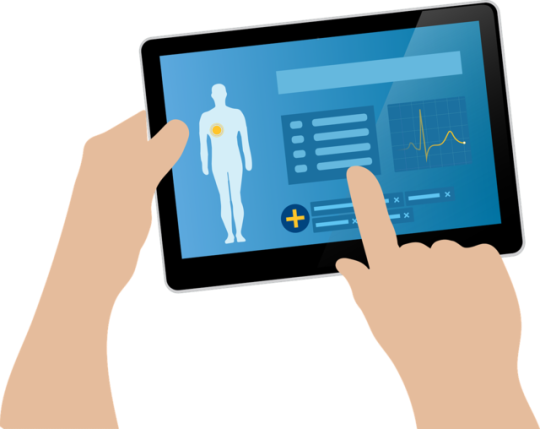
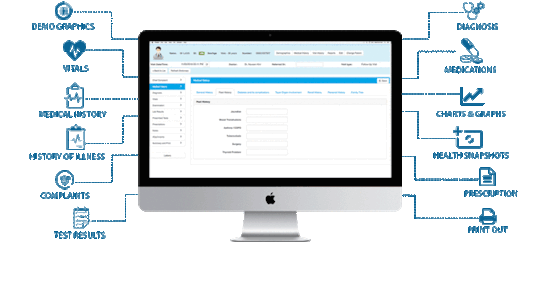
1 note
·
View note
Text
How Low-Code Platforms Are Transforming Healthcare and Elevating Patient Experience
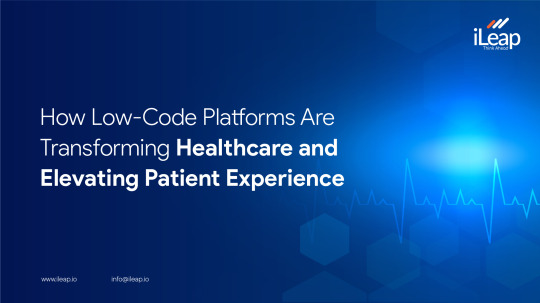
The healthcare sector is a highly evolving landscape. The current race for digitization has made it crucial for service providers to stay updated with the latest technology and regulations. Patient satisfaction is of the highest requirement, but inefficient processes, paperwork, and security concerns often hinder positive outcomes. To enhance speed, transparency, and efficiency, many providers are turning to low-code platforms, driving digital transformation.
Why Low-Code is a Perfect Fit for Healthcare
Low-code platforms enable both technical and non-technical users to build digital healthcare solutions. It simplifies healthcare operations, speeds-up processes and makes healthcare more accessible for patients.
Most healthcare professionals lack IT training, limiting their ability to use digital tools. Low-code bridges this gap by providing an intuitive interface for rapid, cost-effective app development. With scalable architectures and seamless third-party integration, these platforms improve workflows, patient care, and operational efficiency.
Key Benefits of Low-Code in Healthcare
Workflow Optimization and Automation:
Low-code platforms like iLeap streamline administrative and clinical processes. Automating billing, budgeting, and resource management reduces manual effort and errors. Tasks like appointment scheduling and reminders can also be automated, freeing up time for patient care.
Seamless Integration:
A majority of legacy healthcare enterprises rely on legacy systems which is often a major reason for downtimes and slow processes. A robust low-code platform integrates easily with existing software and third-party applications, ensuring unified workflows without IT disruptions.
Customizable Features:
Low-code solutions automate emails, manage patient records, and schedule appointments efficiently. Platforms like iLeap also support threshold management and escalation for timely responses to critical situations.
Enhancing Patient Care with Low-Code
Patient Registration and Records :
Custom applications streamline patient intake, scheduling, second opinions, and billing, reducing wait times and improving experiences.
Automated Appointment Reminders and Feedback:
By automating reminders and surveys, healthcare staff can focus on critical tasks, reducing no-shows and improving service quality.
Telehealth and Centralized Communication:
Legacy systems cause fragmented communication and delays. Low-code platforms facilitate telehealth solutions, including video consultations, secure messaging, and EHR integration, ensuring timely care.
Compliance and Accountability:
Regulatory compliance is crucial. Low-code solutions streamline reporting and documentation, ensuring transparency and adherence to guidelines. By 2030, on-demand compliance reports will be necessary, making digital transformation essential.
iLeap: Driving Digital Healthcare Transformation
iLeap enables healthcare providers to build secure, scalable applications tailored to their needs. By optimizing workflows, financial management, and patient experiences, iLeap helps organizations stay ahead in digital transformation.
Learn more about iLeap’s low-code application development platform. Schedule a call with us
2 notes
·
View notes
Text
Why Custom Healthcare Software Development is Crucial for Efficient Patient Care
In the rapidly evolving healthcare industry, technology is more than just a convenience; it’s a necessity. As healthcare organizations strive to provide the best care to their patients while maintaining operational efficiency, custom healthcare software development has emerged as a game-changer. Tailored solutions designed specifically for the healthcare sector are essential for addressing unique challenges and improving patient outcomes.
The Importance of Custom Healthcare Software Development
Custom healthcare software development involves creating software solutions that are tailored to the specific needs of a healthcare organization. Unlike off-the-shelf solutions, these customized platforms can be designed to address unique requirements, integrate with existing systems, and scale as the organization grows. For healthcare providers, this means having the flexibility to adapt to changing patient demands, industry regulations, and technological advancements.
From patient management systems to telemedicine platforms and EHR (Electronic Health Record) systems, custom healthcare software development ensures that all aspects of patient care are optimized. It enables seamless data sharing between departments, improves the accuracy of medical records, and enhances overall operational efficiency. These tools are especially valuable in reducing administrative burdens and allowing healthcare professionals to focus on delivering care rather than navigating inefficient systems.
Benefits of Healthcare Software Development
Personalization: Custom-built solutions meet the specific needs of healthcare providers, allowing for personalized patient care.
Data Security: Healthcare data is sensitive and requires strict security measures. Customized software can be built with advanced encryption and security features to meet HIPAA compliance standards.
Operational Efficiency: Tailored software reduces redundancy, automates tasks, and streamlines workflows, leading to reduced overhead and faster patient care delivery.
Summary:
Healthcare software development is transforming the healthcare industry by providing healthcare organizations with flexible, efficient, and secure solutions. It enables better management of patient care, improves operational efficiency, and enhances data security, making it an indispensable tool in today’s healthcare environment.
0 notes
Text
Custom Telehealth Software Solutions: Empowering Personalized Virtual Care
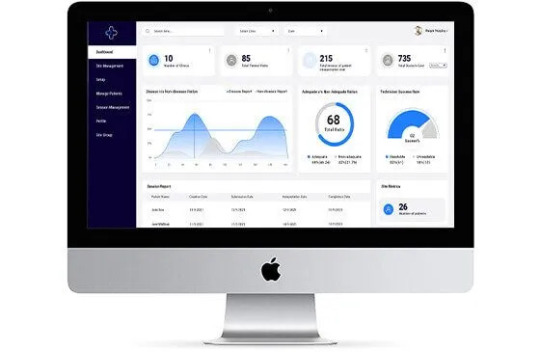
In the evolving landscape of modern healthcare, custom telehealth software solutions are revolutionizing the way care is delivered. No longer a novelty, telehealth has become a cornerstone of patient-provider interactions, enabling accessible, timely, and efficient care. While off-the-shelf telehealth platforms offer standard features, many healthcare providers are now turning to customized solutions to better meet their unique clinical workflows, compliance needs, and patient expectations.
What Are Custom Telehealth Software Solutions?
Custom telehealth software solutions are tailor-made digital platforms designed to support virtual healthcare delivery. Unlike generic platforms, these solutions are developed with specific functionality, branding, and user experience in mind. They can include video consultations, appointment scheduling, EHR integration, secure messaging, e-prescribing, and remote monitoring—engineered to fit a healthcare organization’s exact operational model.
Key Features of Custom Telehealth Solutions
Personalized User Interfaces User-friendly, intuitive interfaces can be designed for both patients and providers, ensuring easy access and interaction with telehealth services.
Seamless EHR/EMR Integration Custom solutions integrate smoothly with existing electronic health records, enabling real-time data access and documentation during virtual visits.
HIPAA-Compliant Security Built with end-to-end encryption, secure login protocols, and data protection features to meet strict privacy regulations like HIPAA or GDPR.
Multi-Specialty Support Platforms can be tailored to accommodate various specialties psychiatry, cardiology, etc.—with specialty-specific tools and workflows.
Remote Patient Monitoring (RPM) Custom modules can be added for tracking vitals and health data from wearables or home-based medical devices, facilitating chronic disease management.
Benefits of Custom Telehealth Software
Scalability: Built to grow with the organization, whether it's a small clinic or a multi-site hospital network.
Branding and Identity: Reflects the organization’s brand, offering a consistent look and feel across all patient touchpoints.
Improved Patient Experience: Custom workflows and communication tools enhance convenience and satisfaction.
Greater Provider Efficiency: Tailored tools streamline operations, reduce administrative burden, and improve clinical outcomes.
Future Outlook
The future of telehealth is hyper-personalized, AI-enhanced, and data-driven. Custom telehealth software is at the heart of this evolution, enabling providers to deliver high-quality care beyond physical boundaries. As healthcare continues to digitize, investing in tailored telehealth solutions is not just a smart move—it’s a strategic necessity.
Conclusion
Custom telehealth software solutions empower healthcare providers to offer personalized, efficient, and secure care that aligns with their mission and meets modern patient expectations. By embracing custom technology, organizations can redefine virtual care delivery and shape the future of digital health.
0 notes
Text
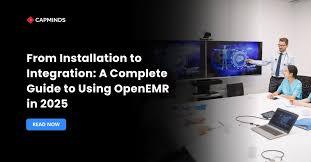
What is OpenEMR? OpenEMR is open-source software that is fully customizable according to their specific needs. It provides patient data digitally. OpenEMR is an ONC Ambulatory EHR Certification.
OpenEMR software can run on Windows, Linux, Mac OS X, and many other platforms. OpenEMR has fully integrated features like Electronic Medical Records, a patient management system, and scheduling.
Why choose OpenEMR? There are a few strong reasons to choose OpenEMR as it can be customized, cost-efficient, enhanced flexibility and scalability.
OpenEMR protects from security threats, ensures data privacy, and offers community support. People can access it from anywhere and at any time because it is a cloud-based software. Data is backed up and retrieved.
Features of OpenEMR Software OpenEMR allows the creation and management of patient medical records that includes medical history, diagnosis and treatment plans. It generates and submits claims to insurance companies that streamlines the medical billing process. Patients can access their medical records, communicate with the providers and schedule appointments through patient portals. It is customizable and flexible to meet the individual needs of providers of different healthcare specialties. Provides tools for appointments, billing and administrative tasks related to the healthcare practice. OpenEMR has a strong community of users and developers providing support and assistance.
0 notes
Text
What Is eClinicalWorks EMR and Why Does It Matter?
eClinicalWorks EMR is a widely used electronic medical record system designed to improve clinical workflows and patient care. Many providers rely on eCW EMR to manage patient data securely and efficiently.
How is eCW EHR Different from EMRs?
While EMRs focus mainly on internal record-keeping, eCW EHR (Electronic Health Record) provides a broader view, sharing data across practices. eClinicalWorks EHR supports full patient histories and interoperability across healthcare networks.

What Makes eClinicalWorks Software Stand Out?
Known for its flexibility and innovation, eClinicalWorks software includes features like telehealth, patient portals, and mobile apps. It’s more than a medical record system—eClinicalWorks EMR software enhances engagement and decision-making.
How Can You Connect eClinicalWorks with Other Systems?
Seamless eClinicalWorks integration is vital for facilities that rely on multiple platforms. With robust eClinicalWorks integration solutions, healthcare providers can connect lab systems, billing software, and external APIs.
What Is the Role of APIs in eClinicalWorks?
The eClinicalWorks API allows developers to build apps and tools that communicate directly with the system. This is crucial for customization and deep eClinicalWorks integration with third-party platforms.
Why Use eClinicalWorks Integration Software?
For advanced workflows, eClinicalWorks integration software offers real-time syncing and automation. It ensures consistent data flow between systems and improves how eClinicalWorks software interacts with external tools.
What Are eClinicalWorks Integration Services?
eClinicalWorks integration services provide expert-led support to connect, configure, and maintain integrations. These services are often paired with the eClinicalWorks API to build custom solutions for unique healthcare needs.
How Do eClinicalWorks Tools Help Providers?
From scheduling to billing, eClinicalWorks software simplifies administrative tasks. With the right eClinicalWorks integration solutions, practices can eliminate redundancies and speed up their operations.
Why Is Choosing the Right EMR Important?
Using a powerful system like eClinicalWorks EMR software can improve clinical accuracy and patient satisfaction. The right eCW EHR setup ensures compliance, security, and smooth collaboration.
Conclusion:
Whether you're optimizing workflows or building custom connections, eClinicalWorks integration services and eClinicalWorks integration software are key to unlocking its full potential. The right configuration turns good tools into great care.
0 notes
Text

Can Healthcare IT Consulting Revive the Failing Digital Backbone of Healthcare?
Healthcare is experiencing a digital paradox. On one hand, we see unprecedented advances in medical AI, telehealth, and patient engagement tools. On the other hand, many healthcare providers still struggle with legacy systems, disjointed data environments, and underperforming technology that impedes real progress. This disconnect between innovation and infrastructure has exposed what many now call a “failing digital backbone.”
The very systems meant to enhance care are becoming obstacles to it. But there is a way forward.
Healthcare IT Consulting Services offer the critical expertise needed to bridge this gap—diagnosing digital weaknesses, orchestrating transformation, and aligning technology with today’s clinical and operational demands. Whether you're a hospital system drowning in fragmented workflows or a public health agency battling outdated infrastructure, strategic IT consulting could be your best path to revival.
#healthcare IT consulting services#healthcare IT solutions#healthcare consulting#healthcare consulting services#IT services for healthcare#healthcare IT consultant#digital healthcare transformation#custom healthcare software development#healthcare technology consulting#top healthcare consulting companies#best healthcare consulting firms#regulatory healthcare consultant#public health consulting#medical IT consulting#healthcare innovation#hospital IT systems#healthcare data management#EHR consulting#Generative AI in healthcare#custom software development solutions
0 notes
Text

Revolutionizing Healthcare: On-Demand Mobile App Development Company for 2025Connect with CQLsys Technologies to build secure, custom healthcare mobile apps that enhance patient outcomes and drive digital innovation.
#Healthcare App Development Company#Healthcare App Solutions#Medical App Development Services#Medical Appointment App Development#Custom Healthcare App Development#Telemedicine App Development#Patient Care App Development#Health Tracking App Development#Healthcare Mobile App Solutions#Health Monitoring App Development#Health Tech App Development#Healthcare Software Development#Healthcare App Development Services#Fitness and Wellness App Development#Healthcare App for Hospitals#HIPAA Compliant Healthcare App Development#Mobile App Development for Healthcare#Healthcare App Development for Startups#Mobile Health App Development#EHR/EMR App Development#Healthcare App Developers
0 notes
Text
App Development in Bangalore: Why HelloErrors is Shaping the Future of Mobile Innovation

In today’s fast-paced digital economy, app development in Bangalore has become one of the most in-demand services for startups, SMEs, and even large enterprises. Bangalore’s identity as a global tech epicenter, paired with its talent-rich ecosystem, makes it a hotspot for innovation, especially in the mobile space.
With thousands of mobile apps flooding the market, standing out requires more than just functionality—it demands strategic design, deep technical expertise, and long-term scalability. That’s exactly what HelloErrors, a leading player in app development in Bangalore, brings to the table.
Let’s explore how HelloErrors is transforming mobile experiences with futuristic, growth-oriented, and intelligent app development solutions.
The Evolution of App Development in Bangalore
Over the last decade, Bangalore has transitioned from a traditional software hub to a mobile-first city. Companies are no longer just digitizing—they’re prioritizing mobile-first strategies to engage customers, optimize internal workflows, and generate new revenue streams.
What makes app development in Bangalore unique today?
Access to top-tier mobile tech talent
A collaborative startup ecosystem
Rapid adoption of AI/ML, AR/VR, and IoT
Government-backed digital infrastructure
Early adopters across B2B and B2C sectors
This evolution has raised the bar for mobile app development companies, pushing them to deliver not just apps, but scalable platforms. That’s where HelloErrors comes in—with a mission to build apps that are technologically robust and business-smart.
HelloErrors: More Than Just Another App Development Company
At its core, HelloErrors is not just about building code—it’s about creating impact through intelligent digital products. The company’s core philosophy is to help clients establish and expand their digital footprint with high-performance mobile applications that resonate with users.
Their team is known for:
Agile project execution
Innovative design thinking
Future-ready tech stacks
Client-centric communication
Rapid prototyping and MVPs
In a city buzzing with competition, HelloErrors has built a reputation for delivering apps that perform, scale, and adapt to changing market needs.
Custom Solutions for Diverse Industries
Unlike many agencies that rely on generic templates, HelloErrors tailors every app project to suit the specific needs of different industries. Whether you’re in healthtech, edtech, logistics, fintech, or lifestyle, they take time to understand domain-specific pain points.
Some industry-specific solutions include:
Healthcare Apps: Appointment scheduling, teleconsultation, EHR management
Edtech Apps: Student portals, live classes, progress tracking
E-commerce Apps: Dynamic product listings, secure payments, CRM integration
On-Demand Services: Real-time tracking, push notifications, geo-fencing
Enterprise Apps: Workforce management, dashboards, ERP mobility
This vertical-focused approach has made HelloErrors a trusted name in app development in Bangalore for companies looking for real business results.
Modular and Scalable App Architecture
Modern apps need to be more than just functional—they need to be modular, secure, and scalable. HelloErrors follows a microservices-inspired architecture and modular coding practices, allowing features to be easily added or upgraded without disrupting the whole system.
Benefits of HelloErrors' architecture include:
Faster deployment cycles
Minimal downtime during upgrades
Easier third-party integrations
Efficient load handling during scale-ups
This makes HelloErrors ideal for businesses planning to launch MVPs and scale gradually over time—a common path for startups in Bangalore.
Transparent Process & Agile Development
One thing that distinguishes HelloErrors in the app development in Bangalore space is its transparent and agile development process. Clients are looped in at every stage, with access to sprints, mockups, wireframes, and demo builds.
Their development approach typically includes:
Discovery Phase: Understanding the goals, user personas, and market competitors
Wireframing & UI/UX Prototyping
Agile Development & Iterative Testing
Real-Device Testing & QA
App Store Deployment & Post-Launch Support
This agile methodology ensures flexibility, reduced risks, and faster go-to-market timelines—vital for companies in today’s competitive app landscape.
Integrating Emerging Technologies for an Edge
Innovation is a key differentiator at HelloErrors. While traditional developers stop at basic mobile functionalities, HelloErrors leverages AI, ML, and IoT to deliver smart, adaptive, and efficient mobile apps.
Examples of advanced tech in HelloErrors apps:
AI-powered chatbots for 24/7 support
ML algorithms for content recommendations
Predictive analytics for user engagement
IoT integrations for real-time device control
Voice command interfaces for hands-free interaction
By staying ahead of emerging trends, HelloErrors ensures your app doesn’t just meet current expectations—it sets future standards.
Design-Led Development with a UX-First Mindset
In a saturated app market, design can be the make-or-break factor. HelloErrors follows a UX-first approach that puts the user at the center of every design decision.
They focus on:
Streamlined user flows
Accessibility and inclusivity
Brand consistency
Emotion-driven interfaces
Lightweight visual assets for performance
This dedication to user experience makes HelloErrors the go-to choice for brands seeking UI/UX app design excellence along with scalable backend logic.
Speed, Support & Cost-Efficiency
Three major concerns most businesses have when outsourcing app development in Bangalore are:
Development speed
Post-launch support
Budget clarity
HelloErrors delivers on all three fronts with:
Rapid MVPs to help you launch fast and iterate based on real feedback
Ongoing support and updates post-deployment
Clear, milestone-based pricing—no hidden costs, no billing shocks
It’s the kind of reliability that builds long-term trust and successful digital products.
Why HelloErrors is the Smart Choice for Your Mobile App
If you're looking for a reliable, transparent, and forward-thinking company for app development in Bangalore, HelloErrors checks all the right boxes.
Here’s a quick recap of what makes them different:
Industry-specific solutions
Agile, modular architecture
Cutting-edge tech integrations
Transparent communication and pricing
Stunning UI/UX design with high retention rates
Proven track record of client satisfaction
Let’s Build the Future—Together
In 2025 and beyond, mobile apps will continue to evolve—from static tools to dynamic, AI-powered, and deeply personalized experiences. If you want to be part of that future, it’s time to collaborate with an expert in app development in Bangalore who sees the big picture.
📲 Ready to turn your app idea into a market-ready solution? Contact HelloErrors today for a no-obligation consultation. Let's co-create mobile experiences that delight, scale, and perform.
#AppDevelopmentBangalore#HelloErrors#MobileAppSolutions#TechInBangalore#UIUXDesignIndia#CustomAppDevelopment#AgileMobileApps
0 notes
Text
How much does it cost to develop healthcare software or a telemedicine app?
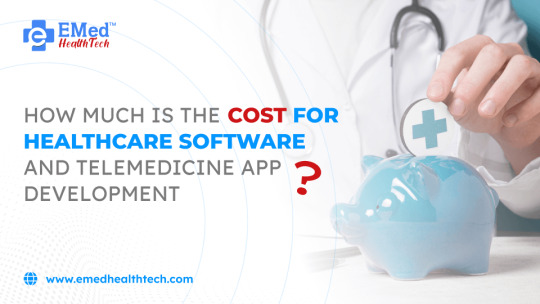
Costs vary depending on features like:
EHR integration
Video consultations
HIPAA/HL7 compliance
💰 Typical ranges: ▪️ Basic app: $15K–$40K ▪️ Full platform: $50K–$250K+
Top healthcare software companies in the US like EMed HealthTech deliver scalable, secure, and custom solutions.
0 notes
Text
How Custom Solutions Enhance Patient Care in Healthcare Settings
Custom software development enables healthcare providers to deliver personalized care through intuitive patient portals, remote monitoring tools, and integrated EHR systems. Built to fit clinical protocols, these solutions improve patient access, communication, and satisfaction while ensuring HIPAA-grade security.
0 notes
Text
Discover why SISGAIN is a leading custom healthcare software development company in Dubai. Explore EHR, telehealth, AI, and mobile app solutions.
Read More - https://sisgaintechnologies.medium.com/why-sisgain-is-a-custom-healthcare-software-development-company-leader-8ac310511332
#customhealthcaresoftwaredevelopmentcompany#healthcaresoftwareDubai#EMRsoftwareUAE#telemedicineappdevelopment#medicalsoftwaredevelopment#hospitalsoftwaresolutions#customemedicalapp
0 notes